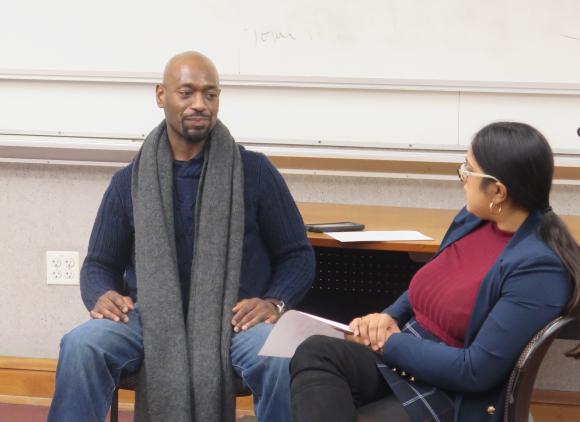
Huwe Burton, left, speaks to Rutgers Law student Farah Rahaman and discusses his years in prison.
Huwe Burton said he was 16 years old and a sophomore in high school in 1989 when he came home from a friend’s house after school to find his mother murdered in her bedroom.
Though her car was stolen by her downstairs tenant the day of the murder, and though Burton had never been in trouble with the law, he was ultimately convicted of the crime and sent to prison. In recounting his arrest, he said he was interrogated for hours by the police without an adult present and promised leniency if he confessed.
Burton, who got out of prison in 2009, was the guest speaker at a program hosted by the Criminal and Youth Justice Clinic on January 19. The clinic has represented Burton in his quest for exoneration since 2010. According to Professor Laura Cohen, director of the clinic, this was the first in a series of clinic-sponsored events to recognize the 50th anniversary of In re Gault, the Supreme Court decision that guarantees due process rights to juveniles who are arrested.
Clinic students Laura Garcia and Farah Rahaman organized and moderated the program. They asked Burton everything from what it was like to serve time in prison, to what advice he had for lawyers who work with juvenile clients.
Burton’s advocates have said there was no evidence linking him to the crime except for the coerced confession and statements made by the tenant, who had previous convictions for rape and aggravated assault. Because he was killed before Burton’s trial, those statements were introduced into evidence but not subject to cross-examination.
Burton said reading books in prison and having qualified attorneys working on his behalf to appeal his sentence kept up his spirits while serving time. He wrote to the Innocence Project, which connected him with the Rutgers clinic, and he said he is still pursuing clearing his name.
He said prison is especially hard on teenagers and young adults, “They may have hard exteriors but you don’t know how vulnerable they are on the inside. They’re scared.”
Since being released on parole, Burton said he was able to get a job, which has been key in helping re-establish his life. Helping ex-offenders become employed is essential to help them integrate them back into society, he said.
“This case has legs now,” he said. “I’m not going to stop.”
Since being released on parole, Burton said he is catching up to the technological advances that have occurred and is still becoming familiar with personal computers and smart phones.
He had this advice for aspiring lawyers, “If you’re fighting for people, let them know. You will be surprised how far you will take someone in spirit.”
He also cautioned the law students who plan to become prosecutors to remain ethical. “If you know someone is guilty, then stand on that truth. If you know they’re innocent, stand on that truth. Don’t take someone’s life.”